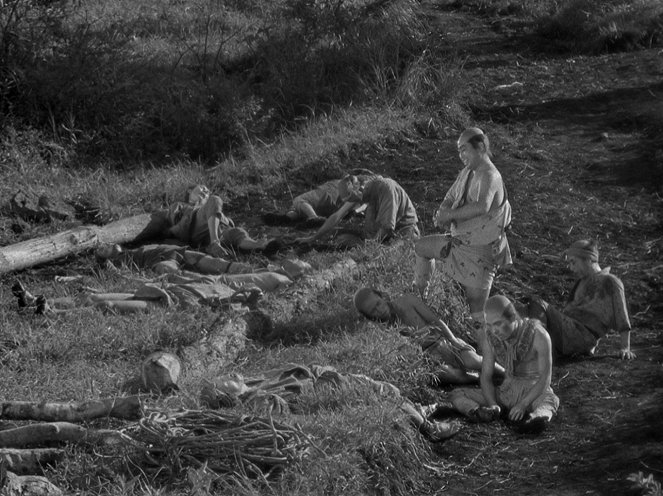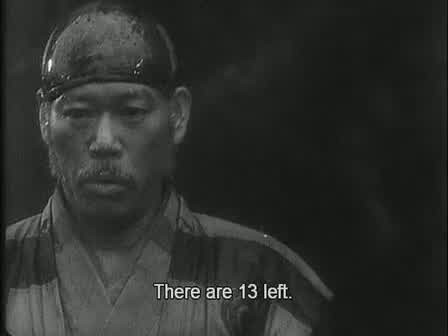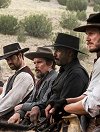Rendező:
黒澤明Operatőr:
Asakazu NakaiZeneszerző:
Fumio HayasakaSzereplők:
Takashi Shimura, Daisuke Katō, Minoru Chiaki, Isao Kimura, Seiji Miyaguchi, Toshirō Mifune, Kamatari Fujiwara, Atsushi Watanabe, Isao Yamagata (több)Tartalmak(1)
Egy ismétlődő rablótámadásoknak kitett falu gazdátlan szamurájokat (roninokat) fogad fel, hogy azok, mint a harc művészei, megvédjék a termésüket. Ez végül nem kis áldozat árán és a falusiak részvételével sikerül is. A rendkívül mozgalmas csatajelenetekben megjelenített harc ellenére sem egyszerű kosztümös kalandfilmet látunk, hiszen Kuroszava itt is az embereket, az emberi kapcsolatokat helyezte a középpontba: a parasztoknak mindenekelőtt magukat, vagyis számító önzésüket, gyanakvásukat kell legyőzniük. Ez a nagy kritikai és közönségsikert aratott, filozofikus mélységű szamurájfilm szolgált egy hasonlóképpen közkedvelt amerikai western, A hét mesterlövész alapjául. (Örökmozgó)
(több)Videók (1)
Recenziók (9)
Even though I'd been interested in Kikuchiya for a long time, even though it entertained me and made me laugh, it was too long... Yes, it's a legendary film that a lot of directors have taken their cue from. It's typically Japanese, those who don't know a bit of the Japanese mentality may be surprised by many things (the film remains misunderstood in many aspects); it flows slowly, it flows gradually, it flows with the seasons. And apparently it's a must for anyone who wants to get to know Kurasawa-sama a little :-) But let's not kid ourselves, the running time is just overlong... :-D
()
The story does not differ from the more well-known American western classic, perhaps only in that Kurosawa gives more space to the villagers and the viewer can sympathize with them more, whereas in The Magnificent Seven, I was more concerned with how many cowboys would survive than with the farmers. I don't like looking for flaws in classics, but three hours for a story about saving a village from bandits is a bit too much, and especially in the middle third, I found myself glancing at the clock too often. This time, Asian grandiosity did not resonate with me.
()
Seven Samurai is considered one of the cornerstones of the action and adventure genre. It is a film that is usually discussed in superlatives and is exceptionally highly rated by film fans. So please explain to me why I felt as if I had worked a full day in a quarry after watching it, even though I watched it with a break and only saw the edited 160-minute version. The original has an additional runtime of 43 minutes. Film critics generally consider Kurosawa's peak creative period to be in the 1950s, but I, on the other hand, believe that while Kurosawa's work in the 1950s was daring, ambitious, and clearly superior in quality to the gray Japanese contemporary production, he was still striving for directorial mastery. His samurai excursions into ancient history suffer from a theatrical acting style that often crosses over into unpleasant affectation. In this regard, Toshiro Mifune's portrayal of Kikuchiyo is sometimes unbearable. It is strange that this characteristic of Kurosawa's historical films is almost unnoticed by others. In comparison to the more famous American remake The Magnificent Seven, Akira ultimately achieved a draw in my eyes, even though both films have their strengths and weaknesses in different areas. The original film has a realistic tone, with the mercenaries not triumphing over a nearly sixfold numerical advantage due to exceptional fighting skills, but rather by joining forces with the village residents, training them in defense of their homes, and teaching them tactics and weapon control. In contrast, the American version is faster-paced and more entertaining, with a reasonable runtime and better-developed characters, but it is steeped in genre clichés and is a typical western fairy tale about invincible gunmen defeating villains. Overall impression: 60%.
()
Seven stars for seven samurais. Oh, I can’t give that many, can I... So at least five of them. The still unsurpassed original which, unlike its more famous remake, loses only in not having a “star" amongst the baddies. Like Calvera in The Magnificent Seven. The western version also wins in terms of pace. In all other aspects, the Kurosawa version is better and since everybody is aware of the qualities of the American remake, I don’t have to sing the Samurais’ praises any further. Along with Red Beard and High and Low, this is Kurosawa’s best piece.
()
The Seven Samurai and The Magnificent Seven clearly demonstrate the difference in the nature of Japanese and American cinema. Where one is distinguished by tough guy gestures, strong speeches, and heroic archetypes, the other relies on a slow pace, pleasure in storytelling, drawn characters, and a much more universal message of war. Even the conclusion of Seven Samurai (the legendary "we were not the ones who won") is completely without pathos and rather involves the tragedy of men who cannot stop fighting because war is their livelihood. Kurosawa's film may be too relaxed for the action genre, permeated with beautiful dialogues and magnificent "twists and turns", but that's what makes it a hundred times more valuable than Sturges' subsequent remake. It's not just a story of few against many, but a story of a real war (which is what the samurai call the defense of the village), which surprisingly lacks the inescapable feeling of "they will wipe them out". The final scene pits 13 highwaymen and a village full of determined defenders against each other! There is no classic villain! The absence of the usual scheme of good vs. evil (the samurai are certainly not saints) and its replacement by believable characters led by the incredible freak Toshiro Mifune endows the film with beautiful poetry that the American bubblegum version can only wish it had. Definitely one of the best war films ever made. Wise, prudent, deep. [I really like The Magnificent Seven, but...]
()
Galéria (57)
Photo © Toho Company Ltd.





Hirdetés